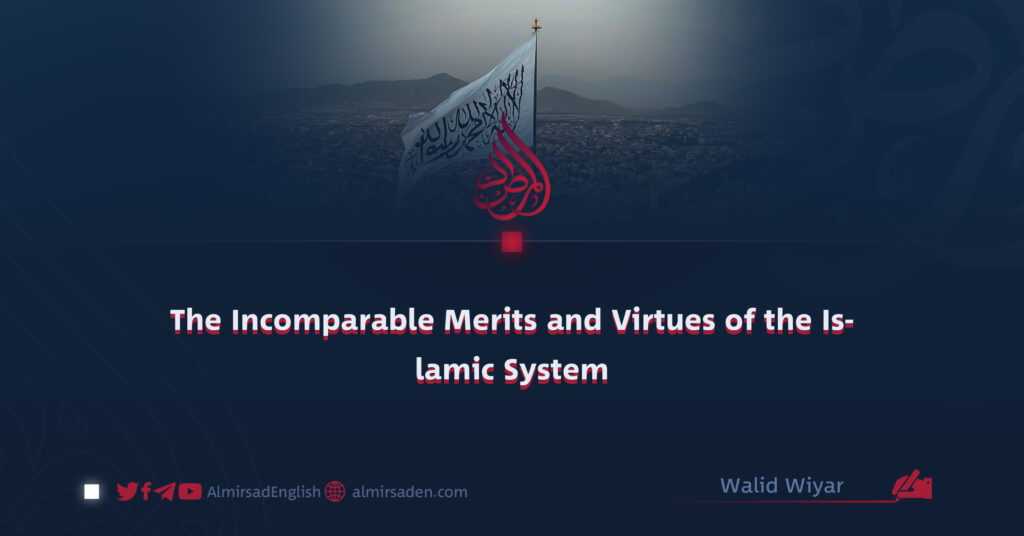Written by: Walid Wiyar
Islam is the final and most comprehensive religion revealed by Allah, addressing the entirety of human life—spiritual, social, moral, and political. It offers a complete system of guidance that is both timeless and universal. The Islamic system, derived from the Qur’an and the Sunnah, provides a holistic framework for organizing individual and collective life, clearly delineating rights, duties, and responsibilities. When its adherents uphold it with knowledge, sincerity, and obedience, it elevates them with honor, dignity, and divine favor.
The rise, glory, and progress of Muslims throughout history stemmed from their adherence to this sacred system—free from the influence of transient political ideologies and worldly powers. It was a system that rejected subjugation and dependence on others, anchoring the community’s identity in submission to the One Eternal Creator. Honor and disgrace were determined not by material success or defeat, but by divine decree.
During Europe’s Dark Ages, spanning from the 6th to the 16th century, the continent plunged into a period of ignorance, repression, and religious manipulation. The clergy, particularly the papacy, exploited the masses by selling indulgences—promises of heaven or threats of hell—in exchange for wealth. In stark contrast, the Islamic world thrived under a system rooted in revelation. It ushered in a golden age of scientific, cultural, and intellectual advancement. Centers of learning flourished, peace prevailed, and justice was administered—all because Muslims submitted sincerely to the divine system of Islam.
Indeed, history bears witness that no system can govern Islamic lands with lasting justice, peace, and prosperity other than the Islamic system. While colonial or temporal regimes may momentarily seize power, they eventually crumble or survive only through foreign backing and coercion. The Islamic system, however, offers enduring advantages, some of which are outlined below:
1. Peace and Security
The word Islam itself derives from salam, meaning peace and safety. One of its foremost promises is to envelop its followers in security—both physical and spiritual. Under this system, peace is not an abstract slogan but a tangible reality, rooted in divine law and upheld by social justice.
Whereas modern governments often prioritize militarization and spend vast resources on security—sometimes at the cost of civil liberties—the Islamic system fosters peace through moral guidance, social responsibility, and the eradication of injustice. It cultivates a society where oppression is forbidden, and every individual enjoys the sanctity of life, property, and dignity.
2. Genuine Independence
In today’s globalized world, most nations lack true sovereignty. They remain tethered to international treaties, financial institutions, or foreign military alliances that compromise their autonomy. In contrast, the Islamic system is not the product of human consensus or political convenience. It originates from the Creator and aligns perfectly with human nature.
True independence, in Islam, means absolute submission to Allah alone. It liberates societies from the shackles of man-made ideologies and foreign domination. This divine framework empowers a nation to act freely, morally, and justly—without compromising its faith or principles.
3. Elimination of Discrimination and Prejudice
Despite the prevalence of modern anti-discrimination laws and human rights conventions, racism, tribalism, and class divisions persist globally. Societies continue to be stratified into privileged and marginalized groups, often based on race, lineage, wealth, or language.
The Islamic system, however, abolishes all such artificial distinctions. It establishes a singular criterion for superiority: Taqwā. The Prophet Muhammad (PBUH) declared in his Farewell Sermon: “No Arab is superior to a non-Arab, nor is a non-Arab superior to an Arab; no white man is superior to a black man, nor is a black man superior to a white man—except in piety.” This principle remains unmatched in its power to unify humanity under a just and ethical order.
4. Governance as Service, Not Domination
The Islamic concept of leadership is a sacred trust (amanah), not a tool for domination. Rulers are public servants accountable to Allah and to the people. Their mandate is to implement justice, uphold Shariah, and ensure the welfare of the Ummah.
Unlike modern political systems marred by authoritarianism, corruption, or fraudulent elections, Islamic governance fosters transparency, accountability, and participation. The people are not enslaved by the system—they are its guardians. When leaders deviate from Islamic principles, the people have the right and duty to correct or remove them.
5. Socioeconomic Prosperity and Development
A central function of the Islamic system is to promote the prosperity and well-being of all individuals. Islam encourages economic activity but prohibits exploitative practices such as usury (riba), excessive taxation, and monopolies.
Rather than concentrating wealth in the hands of a few, the Islamic system enjoins the fair distribution of resources, enforces zakat (obligatory charity), and encourages waqf (endowments) for education, healthcare, and public welfare. It lays the foundation for a self-sufficient, morally upright, and productive society.
6. Patriotism and National Defense
In Islam, patriotism is an extension of faith. The homeland is not merely a geographical space—it is the cradle of divine law, the arena of moral action, and the base for implementing Shariah. When the freedom or integrity of this land is threatened, defending it becomes a religious obligation.
The Islamic system produces defenders who protect the nation not for worldly gains but out of love for their religion and responsibility before Allah. They sacrifice their lives and wealth for the sake of preserving Islamic values, peace, and independence, ensuring the continued application of divine law.
Conclusion: A System for All Humanity
Today, many non-Muslim societies—particularly in Europe—have begun to admire and even adopt elements of the Islamic system. From interest-free finance to community-based welfare models, the enduring relevance of Islamic principles is increasingly acknowledged.
This is a testament to the universal appeal of Islam’s teachings and the practicality of its system. The Islamic order is not limited to any one nation, ethnicity, or century. It is the most complete, sustainable, and just framework for human prosperity. It remains the only system capable of harmonizing spiritual values with worldly affairs, offering a path of peace, honor, and salvation for all of humanity.
